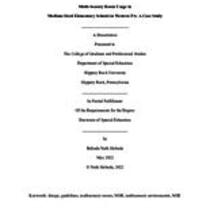- Title
- Middle school teacher and support staff perceptions of Multi-Tiered Systems of Support (MTSS)
- Abstract
-
This dissertation focuses on teacher and staff perceptions of Multi-Tiered Systems of Support (MTSS) implementation at the middle school level. MTSS implementation at the secondary level proves to be a daunting task which includes many complex facets. Ensuring that t...
Show moreThis dissertation focuses on teacher and staff perceptions of Multi-Tiered Systems of Support (MTSS) implementation at the middle school level. MTSS implementation at the secondary level proves to be a daunting task which includes many complex facets. Ensuring that teacher and staff insights are sought out and taken into account when implementing school-wide programming such as MTSS can increase program success and fidelity. Specifically, this study examines three research questions: (1) How do middle school teachers and school support staff perceive implementation of a multi-tiered system of support? (2) How do these perceptions impact the buy-in and level of understanding of MTSS implementation? (3) In what ways do middle school teachers understand the MTSS framework? Utilizing a qualitative, single subject case study design methodology, this study sought to explore how teacher and staff perceptions and understanding of MTSS can impact implementation. The study took place in a suburban, western Pennsylvania middle school, in which the researcher is employed. The constant comparative method of coding was utilized in order to uncover themes related to the collected data. The following themes were uncovered through data analysis: support for all students and addressing individual student needs is a part of the MTSS process, the need for all staff to be involved in MTSS, insufficient communication with off-team teachers, discussion of forms as a part of the MTSS process, parental involvement was not discussed as a priority in responses, and procedures and logistics are discussed in relation to MTSS rather than the day to day implementation through working with students. Results of this study indicate that seeking opinions from teachers and staff regarding program implementation can provide valuable information for schools and districts to consider and highlights the importance of professional development focused on MTSS.
Show less - Year Issued
- 2021
- Author
- Mazzant, Emily
- Sub-title
- a case study in a suburban western Pennsylvania middle school
- Title
- Middle school teacher and support staff perceptions of Multi-Tiered Systems of Support (MTSS)
- Abstract
-
This dissertation focuses on teacher and staff perceptions of Multi-Tiered Systems of Support (MTSS) implementation at the middle school level. MTSS implementation at the secondary level proves to be a daunting task which includes many complex facets. Ensuring that t...
Show moreThis dissertation focuses on teacher and staff perceptions of Multi-Tiered Systems of Support (MTSS) implementation at the middle school level. MTSS implementation at the secondary level proves to be a daunting task which includes many complex facets. Ensuring that teacher and staff insights are sought out and taken into account when implementing school-wide programming such as MTSS can increase program success and fidelity. Specifically, this study examines three research questions: (1) How do middle school teachers and school support staff perceive implementation of a multi-tiered system of support? (2) How do these perceptions impact the buy-in and level of understanding of MTSS implementation? (3) In what ways do middle school teachers understand the MTSS framework? Utilizing a qualitative, single subject case study design methodology, this study sought to explore how teacher and staff perceptions and understanding of MTSS can impact implementation. The study took place in a suburban, western Pennsylvania middle school, in which the researcher is employed. The constant comparative method of coding was utilized in order to uncover themes related to the collected data. The following themes were uncovered through data analysis: support for all students and addressing individual student needs is a part of the MTSS process, the need for all staff to be involved in MTSS, insufficient communication with off-team teachers, discussion of forms as a part of the MTSS process, parental involvement was not discussed as a priority in responses, and procedures and logistics are discussed in relation to MTSS rather than the day to day implementation through working with students. Results of this study indicate that seeking opinions from teachers and staff regarding program implementation can provide valuable information for schools and districts to consider and highlights the importance of professional development focused on MTSS.
Show less - Year Issued
- 2021
- Author
- Emily Mazzant
- Sub-title
- A case study in a suburban western Pennsylvania middle school
- Title
- A multi-level quantitative analysis on factors affecting special education compliance
- Year Issued
- 2022
- Abstract
-
The Individuals with Disabilities Education Act is a federal law that requires that students with disabilities are provided with a Free and Appropriate Public Education. The cost of ensuring FAPE can be quite high for students that require more specialized supports; ...
Show moreThe Individuals with Disabilities Education Act is a federal law that requires that students with disabilities are provided with a Free and Appropriate Public Education. The cost of ensuring FAPE can be quite high for students that require more specialized supports; however, in not meeting that standard, districts may be liable for compensatory education. Much of the responsibility to fund special education, especially in Pennsylvania, falls on the schools to raise through local taxes. This has put schools in very challenging circumstances in regard to their budget. States across the country have conducted a Costing Out Analysis to review the necessary spending levels reviewed for education. Many studies discuss the need for higher funding allocations from state and federal governments so that the high-cost burden does not fall on LEAs and local tax dollars to meet the IDEA compliance requirements. While overall compliance with IDEA has improved over time, it is still an issue that needs to be addressed. This study used multiple regression to determine if there is a link between compliance with the Cyclical Monitoring for Continuous Improvement and factors such as special education spending and percentage of population receiving special education supports. The data are all public record and was collected through Pennsylvania Department of Education online Databases. The data revealed a regression model suggests that the relationship between the number of areas of non-compliance has a significantly moderate negative correlation with both the number of special education expenditures and the percentage of special education students. The model can explain or predict 11.4% of the number of areas of noncompliance in a school district.
Show less - Author
- Karam, Justin
- Title
- Multi-sensory room usage in medium-sized elementary schools in western PA
- Abstract
-
Are multi-sensory rooms the new fad or are they necessary spaces for special education students? This question frequently comes to mind when talking to people outside of the education system. Oftentimes, these rooms receive little consideration when space planning a ...
Show moreAre multi-sensory rooms the new fad or are they necessary spaces for special education students? This question frequently comes to mind when talking to people outside of the education system. Oftentimes, these rooms receive little consideration when space planning a new school. Instead, any extra room or space that has not already been allocated becomes the multi-sensory room. This often does not allow for proper space planning for the needed sensory aids. The multi-sensory room also may be situated in an undesired location within the school that may be distracting. These undesired adjacencies include the lunchroom, auditorium, and gymnasium. Due to this uncertainty of room placement during the design phase of building, a mixed-methods study was conducted to analyze current multi-sensory rooms. This allowed the researcher to examine how well the rooms function for the students and teachers who use them. The mixed-methods study consisted of a Qualtrics survey and in-person interviews with special education teachers. These teachers were from five elementary schools within the same district in Western Pennsylvania. Results of the study indicated that even though multi-sensory rooms were necessary for the special education students’ daily schedule, teachers often supplemented their students’ sensory needs with aids in the classroom. The rooms housing the multi-sensory rooms were generally located in unideal positions within the school; some were adjacent to high activity areas such as the cafeteria and gymnasium, whereas others were out of the way for convenience. These results, as well as their implications for future research and practice, are discussed.
Show less - Year Issued
- 2022
- Author
- Sloboda, Belinda Nuth
- Sub-title
- a case study
- Title
- Music, identity, and authenticity
- Abstract
-
This thesis is the dissemination of the findings of a research study exploring piano-based music improvisation and the lived experience of Black queer men. The overall aim was to explore how five Black queer men experience the intersections of their racial identity a...
Show moreThis thesis is the dissemination of the findings of a research study exploring piano-based music improvisation and the lived experience of Black queer men. The overall aim was to explore how five Black queer men experience the intersections of their racial identity and sexuality in various social environments through piano-based music improvisation. This study grew out of my own experiences as a Black queer man and my ability or lack thereof to authentically express my racial identity and sexuality in specific social environments. Participants were chosen through convenience sampling and were prompted to engage in a series of piano improvisations, where they were asked to musically communicate how they experience their racial identity and sexuality within their biological family, friend group, and society. Data was collected through video recordings of the improvisations, written reflections to questions about the experience, and through transcriptions of the member checking discussions. Following each improvisation, participants were asked to reflect upon two questions regarding their process and experience during the improvisation. The recorded improvisations were then analyzed using Dr. Kenneth Bruscia’s Improvisation Assessment Profiles (IAPs) and interpretations about the participants’ experiences were made. Member checking was utilized to ensure an accurate representation of the participants’ experiences. Themes of 1) prejudice, 2) sense of identity, 3) impacts of relationships, and 4) responses to trauma that emerged in the verbal data were discussed in the context of the individual and collective experiences of the participants with implications for the practice of music therapy.
Show less - Year Issued
- 2021
- Author
- Perkins, Fred
- Sub-title
- reflecting the narratives of black queer men through piano-based music improvisation
- Title
- Music therapists and feelings of clinical inadequacy
- Abstract
-
Abstract In this narrative analysis, semi-structured interviews occurred with six music therapists to examine their experiences of feelings of clinical inadequacy in music therapy. Five themes with twenty-one subthemes emerged in the data: professional development (i...
Show moreAbstract In this narrative analysis, semi-structured interviews occurred with six music therapists to examine their experiences of feelings of clinical inadequacy in music therapy. Five themes with twenty-one subthemes emerged in the data: professional development (insufficient knowledge, lack of training, lack of experience in field/setting, lack of professional support), workspace issues (lack of knowledge of music therapy by others, feeling like an outsider, unrealistic expectations, unfair comparisons, pressure from unrealistic parental expectations), intrapersonal issues (historical wounds, personal vulnerabilities, personal traits), felt experiences (emotional, psychological, visceral, social, physiological, physical), and coping strategies (honest internal observation, professional vulnerability/humility, and compassion). The findings of this study hold implications for education, supervision, and further music therapy research.
Show less - Year Issued
- 2022
- Author
- Dalessandro, Susan
- Sub-title
- A narrative analysis
- Title
- The music therapist's experience of conflicting approaches in the workplace
- Year Issued
- 2023
- Abstract
-
This thesis aimed to explore the lived experiences of music therapists who practice from a different approach than the behavioral setting in which they work. I was interested in whether other music therapists experienced a dissonance that stemmed from conflicting app...
Show moreThis thesis aimed to explore the lived experiences of music therapists who practice from a different approach than the behavioral setting in which they work. I was interested in whether other music therapists experienced a dissonance that stemmed from conflicting approaches in their workplace, as I experienced this dissonance as a new music therapist. After completing an initial interest and demographic survey, nine participants were selected to participate in interviews, where they were asked predetermined questions about their approach to treatment, their facility's approach to treatment, and how they experienced and navigated this conflict. After coding, themes were organized using ATLAS.ti. Five themes emerged: 1) relationships, 2) power dynamics, 3) perceptions, 4) feelings, and 5) bridging approaches. Interpretations of the findings were provided, as well as recommendations for future research and implications for music therapy practice.
Show less - Author
- Goodenough, Haylee




















